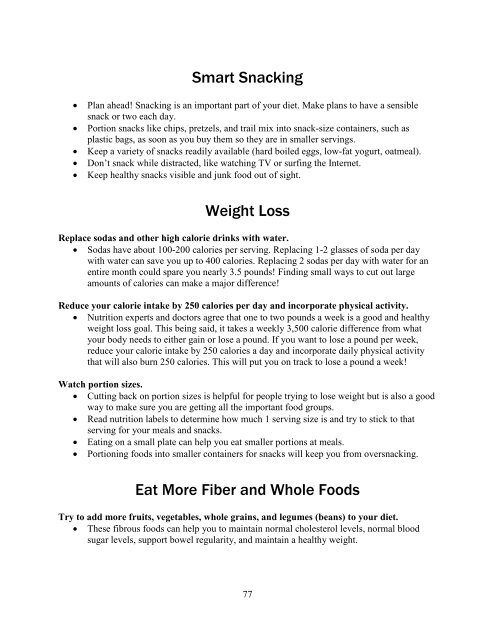Create successful ePaper yourself
Turn your PDF publications into a flip-book with our unique Google optimized e-Paper software.
Smart Snacking<br />
• Plan ahead! Snacking is an important part of your diet. Make plans to have a sensible<br />
snack or two each day.<br />
• Portion snacks like chips, pretzels, and trail mix into snack-size containers, such as<br />
plastic bags, as soon as you buy them so they are in smaller servings.<br />
• Keep a variety of snacks readily available (hard boiled eggs, low-fat yogurt, oatmeal).<br />
• Don’t snack while distracted, like watching TV or surfing the Internet.<br />
• Keep healthy snacks visible and junk food out of sight.<br />
Weight Loss<br />
Replace sodas and other high calorie drinks with water.<br />
• Sodas have about 100-200 calories per serving. Replacing 1-2 glasses of soda per day<br />
with water can save you up to 400 calories. Replacing 2 sodas per day with water for an<br />
entire month could spare you nearly 3.5 pounds! Finding small ways to cut out large<br />
amounts of calories can make a major difference!<br />
Reduce your calorie intake by 250 calories per day and incorporate physical activity.<br />
• Nutrition experts and doctors agree that one to two pounds a week is a good and healthy<br />
weight loss goal. This being said, it takes a weekly 3,500 calorie difference from what<br />
your body needs to either gain or lose a pound. If you want to lose a pound per week,<br />
reduce your calorie intake by 250 calories a day and incorporate daily physical activity<br />
that will also burn 250 calories. This will put you on track to lose a pound a week!<br />
Watch portion sizes.<br />
• Cutting back on portion sizes is helpful for people trying to lose weight but is also a good<br />
way to make sure you are getting all the important food groups.<br />
• Read nutrition labels to determine how much 1 serving size is and try to stick to that<br />
serving for your meals and snacks.<br />
• <strong>Eat</strong>ing on a small plate can help you eat smaller portions at meals.<br />
• Portioning foods into smaller containers for snacks will keep you from oversnacking.<br />
<strong>Eat</strong> More Fiber and Whole Foods<br />
Try to add more fruits, vegetables, whole grains, and legumes (beans) to your diet.<br />
• These fibrous foods can help you to maintain normal cholesterol levels, normal blood<br />
sugar levels, support bowel regularity, and maintain a healthy weight.<br />
77


